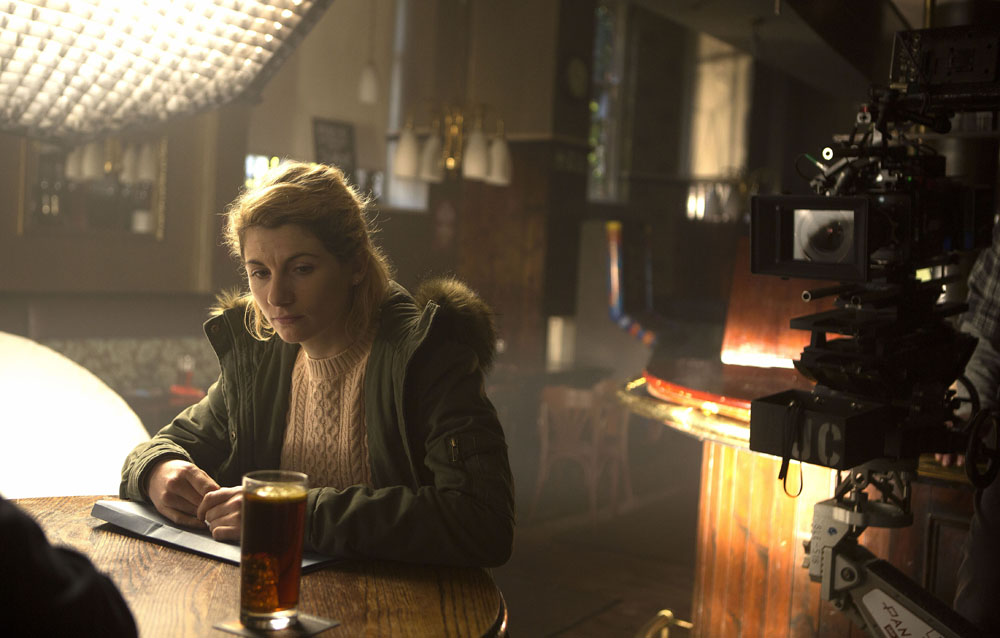Our spoiler-filled Trust Me episode one review.
Trust Me’s striking cold-open drops us straight into action. Heavy breathing, a hospital A&E, a seemingly disoriented Jodie Whittaker, and a call of “Doctor Sutton”- cut. It’s a full 34 minutes before we’re dropped back into that scene. Though that 34 minutes sees a lot of water flow under the bridge.
We skip three months back to re-meet our central character ambling around on another, much less tense, ward. We see her in nurses garb now, and she is called ’Sister’. Four words have been spoken, three written, and the set-up of Trust Me is all-but-complete. Pretty wonderful workmanship, we’ll think you’ll agree.
The odds are, though, that if you’ve just watched Trust Me you already know what it’s about. Truth be told, you’re probably watching it to see Jodie Whittaker’s performance. Her casting as THE Doctor has bought us to peak hype for this four-part BBC drama where she will play another – ‘play’, of course, being the operative word – but her form from Broadchurch back is pretty impeccable, and worthy of our attention Time Lord or no.
Trust us, if that’s why you’re here, you will not be disappointed. Trust Me’s first episode is unequivocally Whittaker’s show. There is scarcely a single frame where she is not front-and-centre. Indeed, her face frequently fills the majority of the screen, leaving little more than subtle expression changes to convey the inner workings of her character. She does the heavy lifting with admirable ease, making her portrayal of the troubled, transgressive Cath Hardacre easy to empathise with. No simple task. She’s way beyond-the-pale here.
Don’t get me wrong, Trust Me is pretty far from deep psycho-drama. Every motivation is clearly signposted in the first episode, and the prima facie reasoning for the events that transpire is established neatly by Dan Sefton’s sparse script. Hardacre’s attempts to highlight problems within the hospital in which she works ends up with her being disciplined by sketchily-drawn middle-management characters. She loses her job. A drunken party hosted by an old Doctor friend leaves her with the seed of an idea, which eventually sees her steal her friend’s identity and use it to get a job as a Doctor on an A&E ward in Edinburgh, living a lie. Thus we drop back into the opening scene, and begin to see the lens-flare filled reality of just how dangerous her duplicity is – for her, her family, her new colleagues and not-least those she is charged to protect and save.

With his history of penning stories for Doctors, Casualty and Holby City it’s little surprise that writer Dan Sefton brings an easy plausibility to the inner workings of the Trust Me’s wards and hospital politics. Indeed, he almost playfully puts us in a couple of Casualty like patient/doctor non-sequiturs. These could easily have been strung out into soapy episodic drama, had there not been significantly higher stakes to play for,
The circumstances of Sister Cath Hardacre’s dismissal are brushed over somewhat quickly, however. This benefits the drama, obviously, by allowing us to move quickly on to Trust Me‘s central conceit at speed. It also benefits Hardacre’s characterisation by heightening her righteous indignation. Realism this is not, though. This is proper drama with little regard for the drawn out procedures of NHS legality, or the culture espoused by the Francis report.
The quick narrative progression means that the tension before Doctor Sutton’s first cut is a nauseatingly gripping piece of TV. We’ve seen the hope and expectation of her colleagues and management alongside some of their own human frailties, we’ve seen the coaching of her daughter in order to protect the secret, the ostracising of he ex-partner, Cath leaving her dementia-riddled father behind, the workload the lie heaps upon Cath herself. Yet you feel that she’s dived straight in.
We’ve seen a relatively fragile-appearing screen that divides the expertise of the best nurses and the Doctors they work with, but now we get a contrasting taste of what it means to have someone’s life in your hands and for everyone to be looking at you. To be ‘on the coalface’, as it’s put, with a scalpel in your hand. I’m guessing we’ll see a lot more.
That the fallout of that opening scene is so drawn out, stark, brutal, and paranoia-infused – and contrasts the ensuing inter-doctor camaraderie so acutely – wonderfully ramps up the stakes and deepens Cath’s betrayal during every quick cut of the subsequent workaday montage. As human beings we sympathise with Cath/Ally, but by the same marker we should be equally repulsed by her actions. It’s an intimate abuse of trust and we know that.
The way it is conveyed on-screen is another neat trick from Sefton’s script that eschews the need for wordy exposition. The direction and editing drive that home. We feel it in our gut. Her actions also take on a very personal angle, following her romantic liaison with Andy (warmly played by Amun Elliott), which ups the ante even more.
The pieces moved into place set up a gripping prospect for the next episode of Trust Me. The past is inexorably chasing Cath Hardacre, and will eventually catch her. It has to, or the injustice will be huge. Sam Kelly (Nathan Welsh), her journalist contact, is already hot on her tail following up her dismissal as a nurse – and the Next Time trailer hints at an ever-growing list of problems that could potentially expose her.
Trust Me offered up a highly engaging hour of TV, and a great slice of BBC Drama. Whittaker carries it, but hopefully later episodes will allow her to share a little more of the space with the peripheral characters and explore the consequences of her actions. One senses that, if she is to pay for her decisions in the narrative, the camera will have to metaphorically and literally move away from her and place her actions in a wider context than just her personal drama, otherwise her conflicted role as both the emotional core and villain of the piece could become increasingly problematic.
It’s unclear if that is how Dan Sefton’s script will go. But this episode shows his work to be keen and sparse, building drama around the words rather than through them. The set-up is admirable and promises a heart-rending pay-off sooner or later. There have to be serious consequences, surely?

